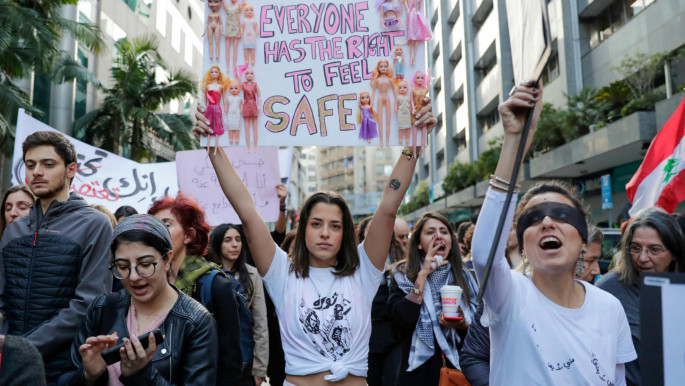Brutal murder of young woman shines spotlight on Turkey's femicide epidemic
President Recep Tayyip Erdogan's Justice and Development Party (AKP) is mulling whether to withdraw from a Council of Europe agreement, known as the Istanbul Convention, designed to combat violence against women.
Party officials announced plans to potentially pull out of the treaty as thousands of women have taken to the streets in recent weeks to demand that the government tackles the widespread problem of gender-based violence in Turkey.
In late July, news of the brutal killing of 27-year-old university student Pinar Gultekin at the hands of her ex-partner sparked outrage across the country. Her strangled and battered body was found dumped in a bin in the south-western Mugla province. The murderer was driven by rejection after she had chosen to end their relationship.
The latest in a growing number of women killed by men, Gultekin's slaying triggered a wave of protests across Istanbul and other cities in a campaign against femicide and gender-based violence that quickly went global.
Turkish feminists launched a black and white photo challenge intended to draw attention to rampant rates of crimes against women in the country.
 |
The brutal killing of 27-year-old university student Pinar Gultekin at the hands of her ex-partner sparked outrage across the country |  |
Since the beginning of 2020, at least 176 women have been killed by their current or former partners, male relatives or assailants, according to Deniz Altuntaş, who is in charge of the data committee at We Will Stop Femicide, an online platform based in Istanbul that tracks homicides against women.
The figure was 474 last year, while the total amounted to 440 in 2018, based on statistics compiled by the monitoring group. The number of killings has doubled since 2012, the rights group reported.
Women and girls are murdered by men nationwide, with motives often driven by women wanting to get separated or divorced, choosing to work, or rejecting men's offers to rekindle relationships.
 |
|
| Trapped with domestic abusers: How Covid-19 lockdowns are endangering vulnerable women across the Middle East |
Turkish journalist Melis Alphan, who is known for her stories on domestic violence and gender equality issues, stated that rampant impunity surrounds cases of femicide and abuse against women, which are rarely reported or publicly decried.
She said that the authorities only take violence against women seriously when an incident receives public attention after being picked up by the press or condemned on social media.
"Women often come to me and ask me to write about their stories of abuse because, once I publish and share them on social networks, they will get due attention and courts will rule more stringently," the reporter told The New Arab. As long as such crimes remain culturally taboo, and therefore concealed, women are unlikely to get the justice they deserve.
With the arrival of the Covid-19 outbreak the incidence of violence against women has dramatically increased, with female victims trapped at home with their abusers, with nowhere to turn. "The government should have taken gender-sensitive precautions to ensure women's access to adequate support services, but it did nothing," Altuntaş said. She blamed Turkish authorities for not complying with the Istanbul Convention during this challenging time, and also before the pandemic.
"Signing the agreement was an important step toward the fight against violence on women, which led to a substantial decrease in femicides afterwards, but numbers later went up again because the deal wasn't really implemented," the anti-femicide campaigner argued, stressing that the tally of murders of women has inflated in recent years.
 |
Since the beginning of 2020, at least 176 women have been killed by their partners or male relatives |  |
The Istanbul Convention of 2011 is the world's first binding instrument to prevent gender-based violence, ensure the prosecution of perpetrators, and provide appropriate protection to female victims.
Despite being the first country to ratify the accord in 2012 - after years of campaigning by women's organisations - Turkey has not implemented it effectively and fully over the last nine years. It has also failed to apply Law No. 6284, introduced following the signing of the convention, which prescribes precautions such as restraining orders for perpetrators and measures to provide close protection for women at risk of violence.
This failure to properly implement the law partly explains why femicides keep increasing, as misogynistic discourses and gender inequality remain rooted in everyday life.
In its last monthly report, We Will Stop Femicide documented 36 killings of women and 11 suspicious female deaths in July alone. For 18 of the 36 victims, the reasons behind the deadly attacks could not be determined.
 |
|
| Read more: The screams of Ahlam: Harrowing honour killing in Jordan sparks movement for justice |
"We know the convention is key to preventing and combating gender-based crime and domestic violence, and also to promoting equality. But a small segment of society is trying to debate it today," Melek, a Turkish women's activist, said, arguing that contesting the landmark anti-violence pact equates to questioning whether women have the right to life.
Turkey's conservative religious groups and Islamist circles have long opposed the treaty and legislation, alleging that it damages family structures and values. They attribute the increase in femicides and violence to the convention.
Although Erdogan was one of the initiators of the convention, the government of the ruling AKP has shifted its position during its 18 years in power, becoming more conservative.
"Just as we have duly signed it [the convention] then it would be possible to duly withdraw from it," AKP deputy chair Numan Kurtulmuş stated in early July. AKP parliamentarian Ahmet Hamdi Çamli recently said: "Women and men are not equal; equality is a huge commotion."
 |
Women from all provinces and social strata in Turkey are raising their voices to say they have the right to choose to work, study, and leave their partners if they are unhappy |  |
Backers of the accord claim that justifying violence through the concepts of customs and traditions leads to more violence against women, and even femicide. They maintain that both the convention and Law 6284 need to be implemented more rigorously across the country.
"If there is violence in the family, what kind of family is it?" Melek said. "It's obvious that we don't protect the family by not applying the laws". The activist insisted that discussing whether to abandon a convention which saves the lives of women is unacceptable, especially amid the disturbing trend of femicides.
Journalist Melis Alphan warned that exiting the treaty will make violence against women more "unseen" and keep it hidden within the walls of their homes, putting victims in greater danger. "We should be discussing how to apply the convention properly, not getting out of it," the journalist underlined.
 |
|
| How TikTok became Egypt's latest battleground against women |
Misunderstandings about the Istanbul Convention derive from poor public awareness about the accord. A study conducted by Istanbul Economy Research shows that 51.7 percent of Turkey's population is still uninformed about the details of the pact.
But apart from a small bulk of the AKP who stand against the agreement, the majority of Turkish citizens support it. Nearly 64 percent of the population objects to Turkey's plans to scrap the Istanbul Convention whilst only 17 percent approve, according to a recent survey run by local polling firm MetroPoll.
The cruel homicide of Pinar Gultekin has been met with a huge reaction both in and outside Turkey as the discussion over whether to leave the convention intensifies. Public figures around the world have shown support for women in Turkey against repealing the agreement.
Thousands of women have also taken to the streets of several Turkish cities to demand the country remain a signatory to the international convention, calling for its proper implementation. Their calls have been met with silence from the government and in some cases arrests, tear gas and rubber bullets by police.
Last Wednesday saw the biggest rally in recent weeks amid growing fears over Ankara's possible withdrawal from the accord as the governing party's executive committee is expected to meet for talks this week.
Under the slogan 'The Istanbul Convention keeps you alive', feminist groups and domestic violence organisations are fighting to demand more protection from the state.
"Women from all provinces and social strata in Turkey are raising their voices to say they have the right to choose to work, study, and leave their partners if they are unhappy," Melek said. "They are free to make decisions about their own lives".
Alessandra Bajec is a freelance journalist currently based in Tunis.
Follow her on Twitter: @AlessandraBajec





 Follow the Middle East's top stories in English at The New Arab on Google News
Follow the Middle East's top stories in English at The New Arab on Google News


